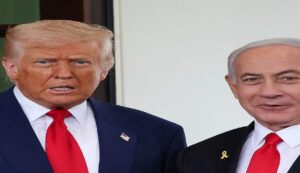Know what new move Iran has made against Trump and Netanyahu, what is the fatwa…
Fatwa: Grand Ayatollah Naser Makarem Shirazi, Iran’s leading Shia cleric, has allegedly issued a fatwa against Israeli Prime Minister Benjamin Netanyahu and US President Donald Trump, marking a significant shift in West Asian geopolitics. This action follows deadly strikes on Iranian territory that were purportedly carried out by Israel and the United States.

Here are the contents of the fatwa, its definition, and the worldwide ramifications of such statements, particularly in nations like India.
What is said in the Fatwa
Grand Ayatollah Shirazi’s fatwa has labeled Benjamin Netanyahu and Donald Trump as “enemies of Allah.” Anyone who threatens or tries to harm Iran’s Supreme Leader Ayatollah Ali Khamenei will suffer divine wrath, the statement warns. The pronouncement has caused a stir in international circles and is being seen as a warning with religious undertones rather than just a political one.
What is a fatwa
The Arabic word “fatwa” refers to a religious decree or legal opinion made in accordance with Islamic Sharia law. A mufti, an Islamic scholar with extensive knowledge of the Quran, Hadith (sayings of the prophets), and Islamic law, usually issues it. A fatwa is meant to provide religious instruction and is an answer to a particular query raised by a believer or authority.
Notably, unless a government decides to enforce it—as is the situation in several Islamic nations—a fatwa is not legally enforceable.
Fatwas are issued by whom
A fatwa cannot be issued by every religious authority. It must originate from a mufti who is qualified and regarded as an authority in Islamic law. A fatwa is given in answer to a religious inquiry and is intended to advise the person who asked it, according to Maulana Arshad Madani, head of Jamiat Ulema-e-Hind. It is a personal religious belief rather than a universal rule.
“Even if I am a cleric, I cannot issue a fatwa,” Madani said. This is only possible for a practicing mufti who has received official religious instruction.
Are fatwas religious or political
Although fatwas are mostly religious, they have sometimes been used in political settings, particularly in nations like Iran where politics and religion are closely related. But according to the majority of Islamic scholars, including those in India, fatwas need to be limited to spiritual or religious issues and should not meddle in political or governmental choices.
In India, how effective are fatwas
Despite having one of the biggest Muslim populations, India does not recognize fatwas as legally binding. Although they are advisory, organizations such as Darul Uloom Deoband do provide fatwas on a range of social and theological issues.
Additionally, the Indian Supreme Court has made it clear that fatwas are not legally enforceable and cannot supersede Indian law. Although they have no formal or legal force behind them, they may have an impact on individual behavior within a community.
One such instance is the Salman Rushdie fatwa.
Ayatollah Khomeini, the supreme leader of Iran at the time, issued one of the most well-known fatwas in contemporary history in 1989 against British-Indian writer Salman Rushdie. In his novel The Satanic Verses, Rushdie was charged with blasphemy by Khomeini, who also demanded his death. Despite his survival, Rushdie endured decades of persistent danger and suffered severe injuries in a stabbing incident in New York in 2022, which many people connected to the long-standing fatwa.
The convergence of religion, politics, and international war in the Middle East is highlighted by the recent fatwa issued against Trump and Netanyahu. Although fatwas have a lot of sway in certain Islamic countries, their application and scope differ widely across countries. Fatwas continue to be private religious recommendations with no legal support in democratic, secular countries like India.
The influence of such religious decrees on the continuing tensions in the Middle East will be keenly monitored by the world community as the situation develops.